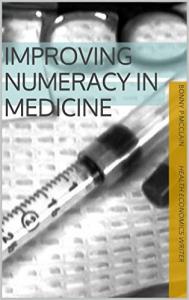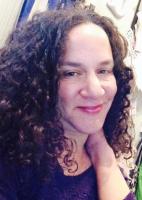Bonny P. McClain: Improving Numeracy in Medicine
Bonny P. McClain, MSc, DC
Data & Donuts, December 15, 2015, $14.99, paper; $9.99 Kindle
ASIN: B015ELRVW4
McClain reports:
According to Karl Pearson, British mathematician and arguably the father of modern statistics, statistics is the grammar of science.
The idea for Improving Numeracy in Medicine evolved from dozens of conversations I had at the 2015 National Health Statistics conference, BMJ Medical Investigative Journalism conference, and other conferences including the Lown, National Physician Alliance, and Preventing Overdiagnosis.
The central thesis in many of these conversations: data.
Experts described how data is used to mislead, misinform, or sensationalize research findings or industry objectives. A cardiology resident told me, "We don't get much numeracy in our medical education."
I decided to create a tool that might ameliorate the confusion.We don't need another statistics or biostatistics book. I can recommend dozens. My aim is to provide an accessible guide to the statistics books already on our shelves, a companion book we can use to illuminate the imperfect world of prediction and analyses.
Highlights from recent peer-reviewed manuscripts anchor discussions of the most common elements of descriptive and inferential statistics. What is a hazard ratio? How do you determine effect size? Number needed to treat? Number needed to harm? Number needed to screen? If clinical literature is truly the foundation of evidence-based medicine, why is it written for statisticians?
Journalists as well as scientists face many challenges in reporting medical research findings. Knowing what questions to ask when you review clinical data will help to improve the quality of your healthcare coverage. What is the finding? What does the finding mean? Could the finding be wrong?
My goal with this book is to ask questions. I want to create a conversation. Because this topic is timely, I opted for the immediacy of self-publication. Let's get the conversation started — one datum at a time.
Contact info:
- Bonny McClain, 336-549-8484, bonny@graphemeconsulting.info, Bonny@dataanddonuts.org
- Blogs: http://www.dataanddonuts.org; http://www.alzheimersdiseasethebrand.com
- Twitter: https://twitter.com/graphemeconsult, https://twitter.com/dataanddonuts
- Facebook: https://www.facebook.com/dataanddonuts/
NASW members: will your book be published soon? Take advantage of this opportunity for shameless self-promotion. Submit your report for Advance Copy.
Tell your fellow NASW members how you came up with the idea for your book, developed a proposal, found an agent and publisher, funded and conducted research, and put the book together. Include what you wish you had known before you began working on your book, or had done differently.
See https://www.nasw.org/advance-copy-submission-guidelines.
Thinking of writing a book? If you are a NASW member, you may access a list of more than 150 books and online resources to help you craft your book proposal, find an agent and funding sources, negotiate your contract, learn about self-publishing, publicize and market your book, and more at https://www.nasw.org/article/write-book.
Send book info and questions about book publishing to Lynne Lamberg, NASW book editor, llamberg@nasw.org.





